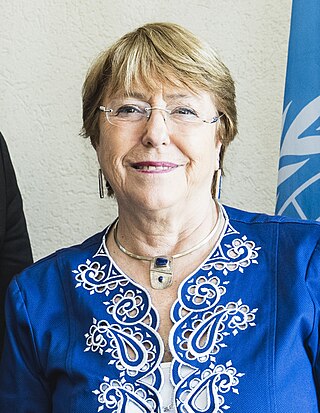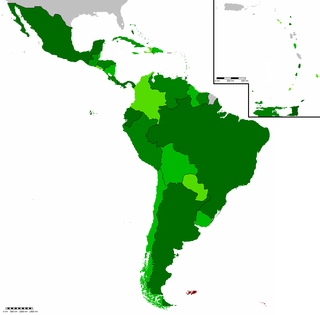| |||||
| Decades: | |||||
|---|---|---|---|---|---|
| See also: | |||||
The following lists events that happened during 1948 in Chile.
| |||||
| Decades: | |||||
|---|---|---|---|---|---|
| See also: | |||||
The following lists events that happened during 1948 in Chile.

Chile's government is a representative democratic republic, whereby the President of Chile is both head of state and head of government, and of a formal multi-party system. Executive power is exercised by the president and by their cabinet. Legislative power is vested in both the government and the two chambers of the National Congress. The judiciary is independent of the executive and the legislature of Chile.

The Organization of American States is an international organization founded on 30 April 1948 to promote cooperation among its member states within the Americas.

The United Nations Economic and Social Council (ECOSOC) is one of the six principal organs of the United Nations, responsible for coordinating the economic and social fields of the organization, specifically in regards to the fifteen specialized agencies, the eight functional commissions, and the five regional commissions under its jurisdiction.

The Socialist Party of Chile is a centre-left political party founded in 1933. Its historic leader was President of Chile Salvador Allende, who was deposed in a coup d'état by General Augusto Pinochet in 1973. The military junta immediately banned socialist, Marxist and other leftist political parties. Members of the Socialist party and other leftists were subject to violent suppression, including torture and murder, under the Pinochet dictatorship, and many went into exile. Twenty-seven years after the 1973 coup, Ricardo Lagos Escobar won the Presidency as the Socialist Party candidate in the 1999–2000 Chilean presidential election. Socialist Michelle Bachelet won the 2005–06 Chilean presidential election. She was the first female president of Chile and was succeeded by Sebastián Piñera in 2010. In the 2013 Chilean general election, she was again elected president, leaving office in 2018.

Patricio Aylwin Azócar was a Chilean politician from the Christian Democratic Party, lawyer, author, professor and former senator. He was the 30th president of Chile and the first president to be elected after the absolute rule of dictator Augusto Pinochet, and his election marked the Chilean transition to democracy in 1990.

Verónica Michelle Bachelet Jeria is a Chilean politician who served as United Nations High Commissioner for Human Rights from 2018 to 2022. She previously served as President of Chile from 2006 to 2010 and from 2014 to 2018 for the Socialist Party of Chile. She is the first woman to hold the Chilean presidency. After leaving the presidency in 2010 and before becoming eligible for re-election, she was appointed as the first executive director of the newly established United Nations Entity for Gender Equality and the Empowerment of Women. In December 2013, Bachelet was re-elected with over 62% of the vote, surpassing the 54% she received in 2006. She was the first President of Chile to be re-elected since 1932. Bachelet, a physician who has studied military strategy at the university level, previously served as the Health Minister and Defense Minister under her predecessor, Ricardo Lagos. She is a separated mother of three and identifies as an agnostic. In addition to her native Spanish, she speaks English fluently and has some proficiency in German, French, and Portuguese.

The Inter-American Treaty of Reciprocal Assistance is an intergovernmental collective security agreement signed in 1947 in Rio de Janeiro among many countries of the Americas.

The Union of South American Nations (USAN), sometimes also referred to as the South American Union, abbreviated in Spanish as UNASUR and in Portuguese as UNASUL, is an intergovernmental regional organization. It once comprised twelve South American countries; as of 2019, most have withdrawn. It was set up by Hugo Chavez to counteract the influence of the United States in the region.

The Socialist Constitution of the Democratic People's Republic of Korea is the constitution of North Korea. It was approved by the 6th Supreme People's Assembly at its first session on 27 December 1972, and has been amended and supplemented in 1998, 2009, 2012, 2013, 2016, 2019 (twice), and in 2023. It replaced the country's first constitution which was approved in 1948.

Juan Somavía Altamirano is the former Director-General of the International Labour Organization (ILO). He was elected to serve as the ninth Director-General of the ILO by the Governing Body on 23 March 1998. On 7 November 2013, he was appointed by UN Secretary-General Ban Ki-moon to serve as Special Adviser on Interregional Policy Cooperation.

The current Constitution of Bolivia came into effect on 7 February 2009 when it was promulgated by President Evo Morales, after being approved in a referendum with 90.24% participation. The referendum was held on 25 January 2009, with the constitution being approved by 61.43% of voters.

On 11 March 1990, Chile the military regime of General Augusto Pinochet ended and was replaced by a democratically elected government. This transitional period lasted roughly two years although some processes may have lasted significantly longer. Unlike most democratic transitions led by either the elite or the people, this democratic transition process is known as an intermediate transition – a transition involving both the regime and the civil society. Throughout the transition, as the regime increased repressive violence, it simultaneously supported liberalization – progressively strengthening democratic institutions and gradually weakening that of the military.

The Constitution of Benin was adopted by referendum on 23 December 1956. The constitution is made up of a preamble, twelve titles, and 160 articles.

The Central American Integration System has been the economic and political organization of Central American states since 1 February 1993. On 13 December 1991, the ODECA countries signed the Protocol of Tegucigalpa, extending earlier cooperation for regional peace, political freedom, democracy and economic development. SICA's General Secretariat is in El Salvador.

The judiciary of the Republic of Chile includes one Supreme Court, one Constitutional Court, 17 Courts of Appeal, 84 Oral Criminal Tribunals and Guarantee Judges; 7 Military Tribunals; over 300 Local Police Courts; and many other specialized Tribunals and courts in matter of family, labor, customs, taxes, electoral affairs, etc.

The Community of Latin American and Caribbean States (CELAC) is a regional bloc of Latin American and Caribbean states proposed on February 23, 2010, at the Rio Group–Caribbean Community Unity Summit, and created on December 3, 2011, in Caracas, Venezuela, with the signing of the Declaration of Caracas. It consists of 33 countries in Latin America and the Caribbean and has five official languages.
The following lists events that happened during 1958 in Chile.
The following lists events that happened during 1978 in Chile.

Hernán Santa Cruz was a Chilean lawyer and diplomat, Chile's first delegate to the United Nations and one of the nine original drafters of the Universal Declaration of Human Rights, one of the most relevant documents of humanity.

Adriana Blanca Cristina Muñoz d'Albora is a Chilean sociologist and politician who serves as a member of the Senate of Chile, representing the 4th constituency of the Coquimbo Region. She previously served as president of the Senate of Chile.